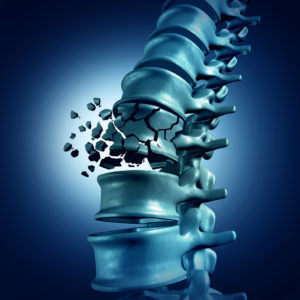There are several factors that can cause an intervertebral disc to herniate, or “slip,” out of position. Before we discuss the causes and symptoms of a herniated disc, it is first important to know that a disc is the cushion between your spine and your vertebrae.

Intervertebral discs protect the spine by acting as shock absorbers during high-impact activity. A “slipped disc” occurs when an intervertebral disc pushes out of position or ruptures.
Although your discs can gradually become herniated over time due to age-related wear and tear, these injuries are often caused by sudden jerking movements that apply too much pressure to the disc. Such abrupt movements are common in car accidents.
If you feel intense pain in your thigh, calf, or buttocks after a serious collision, it may be a sign that you suffered a slipped disc. According to Mayo Clinic, other common symptoms include:
- Foot pain;
- Shoulder pain;
- Arm pain;
- A shooting pain that occurs when you sneeze, cough, or move your spine in certain positions;
- Tingling or numbness; and
- Muscle weakness.
The cost of treating a slipped disc can be exorbitant, and you might have to take several days or weeks off of work while you recover. Fortunately, you may be able to recover compensation for these losses by filing a personal injury claim.
An Albuquerque back injury attorney from The Law Office of Brian K. Branch, PC can investigate your collision, gather evidence, and help you fight for the maximum compensation. Call 505-207-4401 today to schedule a free consultation.
How to Treat a Slipped Disc
If you are diagnosed with a herniated disc, your doctor will recommend that you refrain from any strenuous activity for a few day or weeks while you recover. Your physician may also prescribe medications to help reduce the pain associated with a slipped disc. According to emedicinehealth.com, these medications include:
- Over-the-counter pain meds such as Aleve or Advil;
- Prescription narcotics such as OxyContin or Percacet;
- Muscle relaxers to help with muscle spasms; or
- Anticonvulsants, which may reduce nerve pain.
If your condition has not resolved within a few weeks, your doctor may recommend physical therapy, during which you will learn certain exercises and positions to minimize the pain associated with a slipped disc.
Surgery is rarely necessary for patients who suffered a slipped disc, but your doctor may recommend surgery if you experience consistent loss of bowel or bladder control, weakness, numbness, or difficulty walking or standing. This surgery may involve removing the protruding portion of the disc or removing the disc entirely. In rare cases, the surgeon will implant an artificial disc.
If you suffered a spinal injury in a car accident with a drunk, distracted, or negligent driver, contact The Law Office of Brian K. Branch, PC to discuss your options for recovering compensation. Our attorneys have a combined 32 years of experience in legal practice, and we will compassionately represent your interests. Call 505-207-4401 to schedule a free consultation with a back injury lawyer in Albuquerque.



